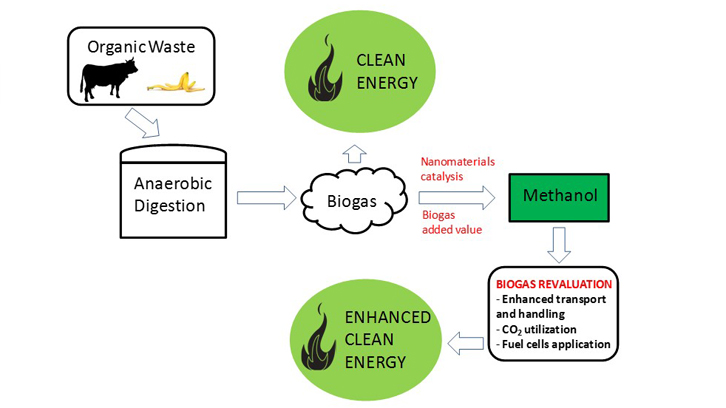Beyond biogas as renewable energy

In 2015, the annual demand for energy translated into 12 billion equivalent tons of oil, BTOE, for its acronym in English. This results in the emission of 39.5 Giga tonnes of carbon dioxide. This index has continued to increase in recent years, which makes it extremely necessary to change the focus on the use of fossil fuels to obtain energy, which lead us to an ever greater and more serious climate change. One of the possible and most accepted solutions for this problem is the use of renewable energies.
Biogas is widely known as a clear example of renewable energy thanks to its high methane content, which can be used as a replacement for fossil fuels for energy production. Biogas, as is known, can be obtained from sustainable processes such as the anaerobic digestion of biodegradable organic waste. However, the two gases that mainly form biogas, methane (CH4) and carbon dioxide (CO2), are also widely known to be gases that contribute to global warming, which is a new problem. Therefore, one of the possible alternatives for the use of biogas is its use as a gas to obtain methanol, in such a way that the generation of biogas is provided with a remarkable added value.
Methanol is a source of clean fuel, which contains a large amount of useful energy, and whose demand is increasing thanks to its use in fuel cell technology applications. It is known that fuel cells are a sustainable source of energy, with zero emission of combustion products, which in turn can be designed for portable power generation devices. At the same time, unlike biogas, methanol is liquid at room temperature, which facilitates transport and handling, reducing economic and environmental costs.
In addition, if produced, the conversion by hydrogenation of the CO2 present in the biogas to methanol would mean a total revaluation of the biogas, promoting anaerobic digestion as a potential source of energy and raw material for chemical synthesis processes from methanol.
The project presented, therefore, links to two lines of high interest such as renewable energy and the generation of new nanostructured materials. The latter will be used as catalysts of a reaction that aims to achieve the conversion of methane and carbon dioxide as major components of a renewable energy source such as biogas, in another source of renewable energy such as methanol, which presents important advantages with regard to biogas at transport and handling levels. In addition, methanol can be used for the generation of other products with high added value. The mentioned materials, which will stand out for their high robustness and selectivity, will serve as catalysts for the oxidation of methane to methanol and the hydrogenation of the carbon dioxide present in the biogas to methanol. In this way, given that the sum of methane and CO2 account for practically all of the biogas, this could be catalysed to methanol as a block, after elimination of the impurities existing in the biogas. Also, it is intended to conduct a study of the environmental impact and economic efficiency of the process to assess its viability in these terms.
Universitat Autònoma de Barcelona
References
Project: Más allá del biogás como energía renovable: conversión a metanol mediante nanopartículas metálicas en soportes tipo Metal-Organic Frameworks (MOFs). Proyecto concedido por la Fundación Ramón Areces.
Reference articles:
[1] N. Abas, A. Kalair, N. Khan.(2015). Review of fossil fuels and future energy technologies. Future, 69, 31-49.
[2] P. Weiland. (2010). Biogas production: current state and perspectives. Appl Microbiol Biotechnol, 85, 849–860.
[3] Z. Zakaria, S.K. Kamarudin. (2016). Direct conversión technologies of methane to metanol. Renewable and sustainable energy reviews, 65, 250-261.
[4] S. Wasmus, A. Kuver. (1999). Methanol oxidation and direct methanol fuel cells: a selective review. J Electroanal Chem 461, 14-31.

